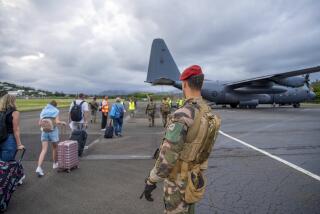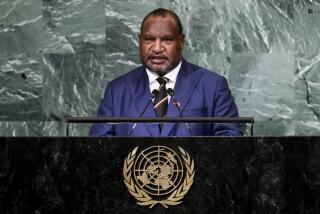Fijian Troops Deployed After Ethnic Clashes
- Share via
SUVA, Fiji — Army troops patrolled nearly deserted streets early today to prevent looting after ethnic clashes, while Fiji’s governor general and the island nation’s Great Council of Chiefs sought a way to end the governmental crisis in the wake of last week’s military coup.
More than 50 people were reported injured Wednesday when young Fijians attacked ethnic Indians at an outdoor prayer meeting in the first racial violence since the coup.
New Zealand and Australia advised tourists to postpone plans to travel to the 300-island South Pacific archipelago, a major vacation spot for both countries.
The Great Council, made up of 66 traditional leaders from Fiji’s 14 provinces, adjourned for the day without deciding how to restore constitutional rule in this former British colony. It plans to meet again today.
Members of the council were thought to be considering an amendment to assure ethnic Fijians political dominance over ethnic Indians, who slightly outnumber them.
Ethnic Indians make up 49% of the nation’s 715,000 people, and native Fijians are 47%. Indians, most of them descended from indentured laborers brought here by the British in the 19th Century, dominate commerce. Fijians have controlled politics.
Such an amendment was among the goals of Lt. Col. Sitiveni Rabuka, who stormed Parliament last Thursday and arrested Prime Minister Timoci Bavadra and his month-old government. Bavadra is an ethnic Fijian, but his Cabinet had an Indian majority.
Bavadra and the others were freed Tuesday. After meeting with Governor General Ratu Penaia Ganilau, Bavadra told reporters he would work for national reconciliation and oppose a strike by Indian businessmen.
Ganilau and Lt. Col. Rabuka appealed for calm after the violence, in which about 200 Fijians punched and kicked ethnic Indians assembled for a prayer meeting in the park outside the building where the chiefs were meeting.
The Indians had gathered in support of the Bavadra government, which was elected April 11 and was the first to be dominated by Indians in Fiji’s 17 years of independence.
At one point during the day, Rabuka addressed the crowd in the park to appeal for calm. He later delivered the same message on Fiji radio.
Ganilau also spoke on the radio. He said he would attend today’s session of the Great Council and explain his decision to dissolve Parliament, call new elections, dismantle the military regime and pardon those involved in the coup.
He said he would delay appointment of an interim advisory council until the chiefs made their recommendations. He urged the people to “be calm, and most of all, be patient.”
More to Read
Sign up for Essential California
The most important California stories and recommendations in your inbox every morning.
You may occasionally receive promotional content from the Los Angeles Times.









